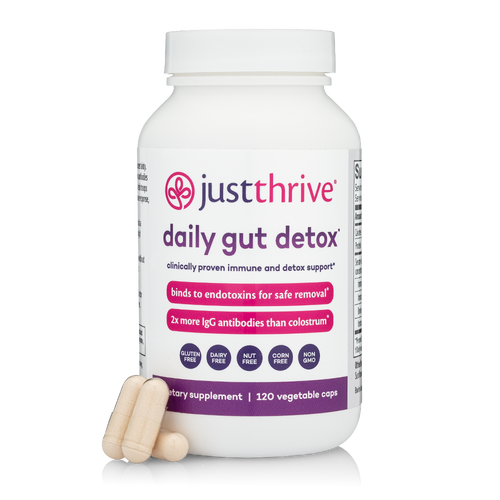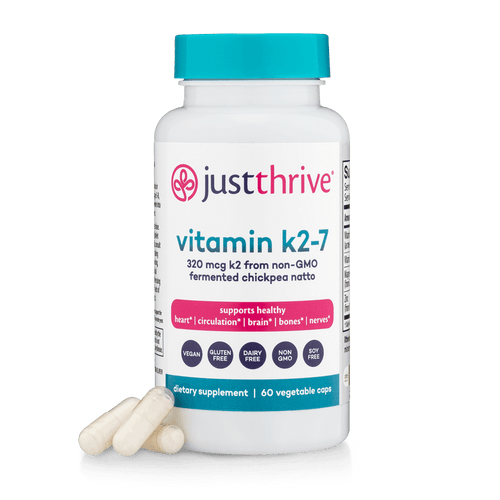Even if you’re consuming enough you could be running low
Even if you eat a healthy diet… even if you take supplements… you could still be running low on essential minerals.
Ones like calcium, magnesium, iron, zinc, and selenium that keep your body running. They’re involved in virtually every process in your body, affecting everything from cognition to heart rhythm to fertility.
If your levels are running low, it can cause serious health problems.
That’s why it’s so important to make sure your body can absorb and use all the minerals you take in.
And one of the most common reasons for mineral deficiencies starts in your gut.
Top 3 Reasons You May Be Mineral Deficient
There are concrete reasons so many people have mineral deficiencies. Especially essential minerals such as calcium, magnesium, zinc, selenium, and iron.
According to the Linus Pauling Institute, 52.2% of Americans are low in magnesium and 44.1% have low calcium. Research shows that 38.6% are iron deficient[1] and 17% are zinc deficient.[2]
Here are three main reasons for those common mineral deficiencies.

Reason 1: Depleted soil
Modern farming methods have stripped the soil of key minerals, the ones we need to survive and thrive. Even if you eat a healthy, varied diet rich in fruits and vegetables, you may be getting much lower levels of many minerals than expected. Research shows that since the 1980s nutrient loss has soared. For example, up to 24% loss of magnesium, 46% loss of calcium, and 59% of zinc.[3]
Reason 2: Common medications
Many long-term and commonly prescribed medications can interfere with or even deplete minerals. These include:[4]
- Proton pump inhibitors
- Aspirin
- Diuretics
- Blood pressure drugs
- Metformin
- Steroids
- Oral contraceptives
Reason 3: Gut dysbiosis
Your gut microbiome contains trillions of bacteria. When it’s in healthy balance, a diverse population of beneficial probiotic bacteria vastly outnumber harmful pathogens. But sometimes, pathogens can overgrow and dominate the microbiome. That causes a condition called dysbiosis. Research shows that gut dysbiosis interferes with mineral absorption, increasing your risk for deficiencies.[5]
You may not have much control over the first two reasons. But, luckily, you can take proactive steps to keep your gut in healthy balance. Because gut dysbiosis is one of the biggest threats to your nutrient status.
Gut Dysbiosis Disrupts Mineral Absorption
Your gut bacteria affect how well your body can absorb and utilize minerals. Probiotic bacteria support mineral absorption in two very important ways.[6]
First, they produce enzymes called phytases that help your body release usable forms of minerals from your food.
Second, they create short-chain fatty acids (SCFAs) that lower intestinal pH, which makes it easier for your body to extract and use minerals, increasing their bioavailability.
But gut imbalances get in the way of those crucial functions. When your gut microbiome is in a state of dysbiosis, phytase production drops off significantly. Pathogenic bacteria also increase intestinal pH, reducing mineral absorption.
Dysbiosis decreases the bioavailability of essential minerals, leading to deficiencies even when you’re consuming plenty of nutrients.
5 Common Mineral Deficiencies
If you’re living with issues that seem to have no obvious cause, you may be dealing with mineral deficiencies. These minerals are essential for life. They contribute to dozens… hundreds… of biological processes every minute of every day. And if your body isn’t absorbing enough of these nutrients, it can start to break down.
Here’s a quick look at five minerals most people don’t have enough of, what they do, and what happens when they run low.
1. Iron
Your body uses iron to create hemoglobin, the part of red blood cells that carries oxygen to every part of your body. It’s also critical for immunity, cellular energy production, and thyroid hormone function.
Low iron levels can cause a variety of symptoms including:
- Extreme fatigue
- Weakness
- Dizziness
- Pale skin
- Brittle nails
- Restless legs
2. Zinc
This essential mineral performs critical work in your body. It plays key roles in immune performance, wound healing, healthy pregnancy, memory and learning, and managing inflammation.
Low zinc levels can cause a variety of symptoms including:
- Frequent illnesses
- Thinning hair or hair loss
- Discolored or brittle nails
- Irritability
- Low energy
- Slow healing
- Low sperm count
3. Magnesium
Every cell, organ, and system in your body relies on magnesium to function. It plays an important part in growth, metabolism, enzyme production, heart function, kidney function, and sleep.
Low magnesium levels can cause a variety of symptoms including:
- Muscle cramps or weakness
- Constipation
- Fatigue
- Nausea
- Abnormal heart rhythms
- Loss of appetite
- Headaches
4. Calcium
Calcium does more than provide structure to your bones and teeth. It’s critical for proper nerve function, blood clotting, muscle movements, stable heart rhythm, and immune function.
Low calcium levels can cause a variety of symptoms including:
- Brittle nails
- Coarse hair
- Muscle cramps
- Memory lapses
- Depression
- Dry skin
- Irregular heartbeat
- Bone loss
5. Selenium
Your body uses selenium for vital functions including DNA creation, powerful antioxidant protection against free radicals, thyroid hormone production, immunity, fertility, and inflammation management.
Low selenium levels can cause a variety of symptoms including:
- Infertility
- Weak muscles
- Brain fog
- Fatigue
- Frequent infections
- Hair loss
When levels of any of these essential minerals gets dangerously low, more serious conditions can develop. So you’ll want to make sure your body is getting every microgram of these nutrients out of your food and supplements that it can.
Probiotics Improve Mineral Absorption
The best way to promote optimal mineral absorption—and the one you have the most control over—is keeping your gut microbiome in healthy balance. That means a microbiome fully loaded with a diverse population of probiotic bacteria. Sending reinforcements into your gut with probiotic supplements can make all the difference when it comes to healthy mineral levels.[7]
Spore probiotics in particular can help maintain a well-balanced gut microbiome, rich with a wide variety of beneficial bacteria. Unlike other probiotics, spore probiotics have a protective shell that lets them survive the hazards of digestion and arrive in the gut 100% alive and ready to work.
In addition, spore probiotics such as Bacillus subtilis and Bacillus coagulans produce phytase, the enzyme that promotes mineral bioavailability.[8] And spore probiotics also encourage SCFA-producing probiotic bacteria to grow and flourish in the gut. This helps keep the gut pH where it needs to be for maximum mineral extraction and absorption.
Vitamin K2-7 Regulates Calcium Utilization
You want to get the most from every mineral, and for some, that can involve other nutrients that work to unlock them or are needed as co-factors. Calcium is one mineral that needs a lot of support in the body. And that starts with vitamin K2-7.
Vitamin K2-7 acts as a calcium manager. It directs calcium into your bones where it belongs and away from blood vessels, soft tissues, and vital organs… where you absolutely don’t want it.[9] Vitamin K2-7 also activates calcium-regulating proteins that promote mineralization.[10]
Calcium also needs to lean on zinc and magnesium to function properly. These two minerals act as calcium co-factors to support bone, heart, and immune health.[11] Magnesium helps keep calcium in balance, helping it stay out of blood vessels and manage blood pressure. Zinc plays a role in bone calcification and helps cells manage their calcium levels. And all three of these minerals play critical, but different, roles in immunity.
Increasing vitamin K2-7 intake helps unlock all the benefits of calcium. And its co-factors help your body fully utilize essential minerals.
Get the Most Out of Your Minerals with Total Body Boost
You put a lot of thought into your diet, and you want to get the most out of every bite you consume. You especially want to make sure you have enough of the essential minerals needed to keep everything running the way it’s supposed to.
Total Body Boost can help your body absorb and retain crucial minerals. This bundle includes Just Thrive Probiotic and Vitamin K2-7.
Just Thrive Probiotic is powered by clinically tested spore probiotics that deliver unmatched support to your gut microbiome and gut barrier. It contains four proven spore strains:
- Bacillus indicus HU36™
- Bacillus subtilis HU58™
- Bacillus clausii
- Bacillus coagulans
Vitamin K2-7 delivers an optimal daily dose of pharmaceutical grade vitamin K2-7 to support complete calcium utilization. It also includes crucial co-factors magnesium and zinc for optimal mineral performance.
>> Count on Total Body Boost every day to get more out of the minerals you consume. (Bundle & save!)
Not sure if Total Body Boost is right for you? We've got your back!
We’re confident that when you take Total Body Boost as directed, you’ll notice positive benefits to your overall health.
But if you aren’t completely happy, let us know.
Every Just Thrive purchase comes with our Bottom of the Bottle, 100% money back guarantee.
So, if you’re not satisfied with your purchase for any reason, you can request a full product refund at any time. Even if it’s been 3 days… 3 weeks… or 3 months. Even if the bottle is empty!
Sources
- Weyand AC, Chaitoff A, Freed GL, Sholzberg M, Choi SW, McGann PT. Prevalence of Iron Deficiency and Iron-Deficiency Anemia in US Females Aged 12-21 Years, 2003-2020. JAMA. 2023 Jun 27;329(24):2191-2193.
- Baddam S, Maxfield L, Shukla S, et al. Zinc Deficiency. [Updated 2025 Aug 2]. In: StatPearls [Internet]. Treasure Island (FL): StatPearls Publishing; 2025 Jan-. Available from: https://www.ncbi.nlm.nih.gov/books/NBK493231/
- Bhardwaj RL, Parashar A, Parewa HP, Vyas L. An Alarming Decline in the Nutritional Quality of Foods: The Biggest Challenge for Future Generations' Health. Foods. 2024 Mar 14;13(6):877.
- Mohn ES, Kern HJ, Saltzman E, Mitmesser SH, McKay DL. Evidence of Drug-Nutrient Interactions with Chronic Use of Commonly Prescribed Medications: An Update. Pharmaceutics. 2018 Mar 20;10(1):36.
- Skrypnik K, Suliburska J. Association between the gut microbiota and mineral metabolism. J Sci Food Agric. 2018 May;98(7):2449-2460. doi: 10.1002/jsfa.8724. Epub 2017 Oct 31. PMID: 28991359.
- Barone M, D'Amico F, Brigidi P, Turroni S. Gut microbiome-micronutrient interaction: The key to controlling the bioavailability of minerals and vitamins? Biofactors. 2022 Mar;48(2):307-314.
- Barkhidarian B, et al. Probiotic Supplementation and Micronutrient Status in Healthy Subjects: A Systematic Review of Clinical Trials. Nutrients. 2021 Aug 28;13(9):3001.
- Varvara R, et al. Probiotic-driven advancement: Exploring the intricacies of mineral absorption in the human body. Food Chemistry: X, Volume 21, 30 March 2024, 101067
- Flore R, et al. Something more to say about calcium homeostasis: the role of vitamin K2 in vascular calcification and osteoporosis. Eur Rev Med Pharmacol Sci. 2013 Sep;17(18):2433-40. PMID: 24089220.
- Alonso N, Meinitzer A, Fritz-Petrin E, Enko D, Herrmann M. Role of Vitamin K in Bone and Muscle Metabolism. Calcif Tissue Int. 2023;112(2):178-196. doi:10.1007/s00223-022-00955-3
- Pepa GD, Brandi ML. Microelements for bone boost: the last but not the least. Clin Cases Miner Bone Metab. 2016 Sep-Dec;13(3):181-185.














